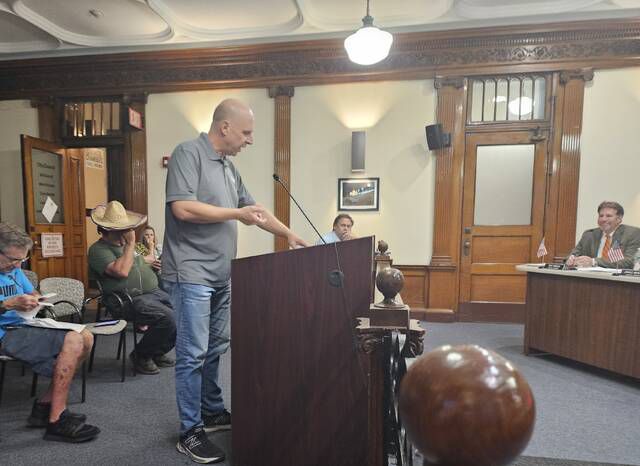
WILKES-BARRE — Despite having only one item on the agenda, Wilkes-Barre City Council had plenty to discuss during Thursday night’s session.
The sole agenda item sought authorization to move forward with the demolition of the property located at 493 South Franklin St.
The property’s decrepit condition was brought to the city’s attention following the Wilkes-Barre City Fire Department’s response to a blaze behind the structure.
Wilkes-Barre resident Sam Troy offered council a suggestion for properties similar this moving forward, which he says might help reduce homelessness, even if just fractionally.
“There is drastic shortage of affordable housing in the city,” Troy said.
“Is there any chance that when you find a property that is in such a terrible state that it has to be demolished, can the city consider renovating these properties or, if you have to demolish it, can you arrange to buy it and build something that can be affordable to low-income people?” he added.
Councilman Bill Barrett agreed with Troy’s suggestion, but noted that it simply is not feasible for the property on South Franklin Street.
“I agree with what you’re saying, but in certain cases it would cost more to do that than what the end result would be,” Barrett said.
“This particular property looks great from the front, but if you go around the back, it’s falling in on itself, so there’s no way some of these properties can be rehabbed,” he added.
The property on South Franklin Street will cost $27,000 to demolish, and council awarded SRI, the lowest responsible bidder, the contract for the job. The city will place a lien on the property in an attempt to recoup funds from the property’s owner.
In the four years that Brown has been Mayor, he has spent approximately $400,000 on demolishing structures in the city. Such purchases are part of Mayor Brown’s Blight Remediation Plan, which identifies properties by their severity of disrepair and determines if they can be fixed or if they need to be demolished for the safety of the public.
The Blight Remediation Plan began when Brown took office in 2020 and has continued since.
‘Utility graffiti’
While Abide Coffeehouse Co-owner Dan Shission praised the city and its officials for the coffeehouse’s warm welcome to downtown, he did bring an issue to council’s attention that struck a nerve with one city council member.
Shission shared his excitement for the new improvements going in the city — notably the new brick sidewalks and roadway outside of his business on West Market Street.
“It’s beautiful — picture perfect,” Shission said. “And then last week, I went out and what do I see but spray paint on all the bricks and sidewalks from the utility companies.”
According to Shission, the neon spray paint is not the only nuisance to business.
“Being a small business, it’s really tough to come in in the morning and find out that your street is being closed — especially if you’re a one way street like we are,” Shission said.
“Is there something we can do in the future to make the utility companies aware that it’s hurting small businesses and residents and to be aware and conscious of us by making accommodations with the city to remedy that?”
Councilman Tony Brooks sympathized with Shission’s concerns, noting that he had to call the utility companies for similar issues on his own street just last month.
“When it comes to this utility graffiti on the streets, this is one of my pet peeves and it bothers me so much,” Brooks said.
Brooks also suggested requiring the utility companies to notify those in the areas they will be working of what they’re doing, as well as only placing the signage one day before they begin the work.
“Instead, you have this graffiti for months and months and it’s just a shame,” he said.
